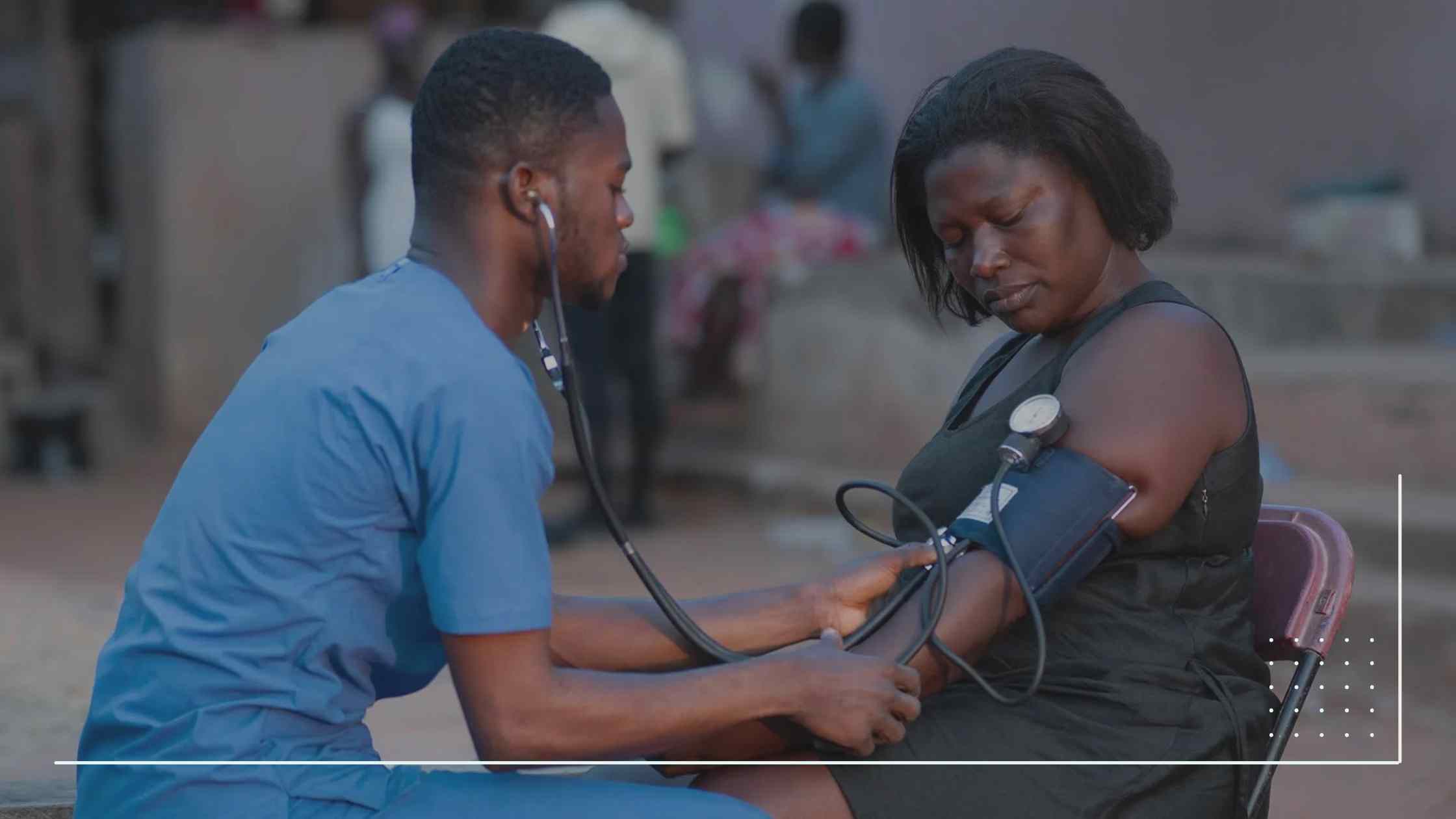Health Insurance in Nigeria: Plans, Benefits, Challenges

by Counseal Team
Updated April 21, 2024

In a world where unexpected health issues can pop up at any time, having a safety net is essential. This is where health insurance comes into play. But what exactly is health insurance, and why is it so crucial, particularly in Nigeria?
Well, out-of-pocket health expenses can be significant in Nigeria. A report from the World Health Organization (WHO) indicates that Nigerians spend an average of 77% of health expenses out-of-pocket. This outlay can be a heavy financial burden, especially for low-income families.
So, what’s the solution? Health insurance, of course! But there’s still a long way to go.
Now, let’s delve deeper into the world of health insurance in Nigeria!
Understanding Health Insurance: A Deep Dive

Health insurance is a term we often hear but seldom understand in depth. So, what exactly is health insurance? Health insurance is a type of coverage that pays for your medical and surgical expenses incurred by the insured. Depending on the type of insurance coverage, either the insured pays out of pocket and is later reimbursed, or the insurer makes payments directly to the provider.
In simple terms, it’s like a safety net for your health-related expenses. But hold on a minute, did you know that not all health insurance plans are created equal? Yes, there are different types of health insurance plans available, each with its unique features and benefits.
Types of Health Insurance Plans
Let’s delve into some of the most common types of health insurance plans:
- Health Maintenance Organization (HMO): With an HMO plan, you are required to use healthcare providers within a specific network, and you need a referral from your primary care physician to see a specialist.
- Preferred Provider Organization (PPO): PPO plans offer more flexibility. You can see any healthcare professional without a referral, both inside and outside of your network.
- Point of Service (POS): A POS plan is a hybrid of HMO and PPO. You need a referral to see a specialist, but you can see any healthcare professional without a referral, provided they are within your network.
But how do these plans stack up against each other? Let’s take a look.
HMO vs PPO vs POS: A Comparative Analysis
When it comes to choosing a health insurance plan, it’s not a one-size-fits-all scenario. Your choice depends on your specific health needs, your budget, and your preferred level of flexibility.
- HMO: HMO plans are typically more affordable but offer less flexibility. They are a good choice if you prefer lower out-of-pocket costs and don’t mind a limited network of doctors.
- PPO: If you prefer more flexibility and are ready to pay a higher premium, a PPO plan may be the right choice for you. You have the freedom to see any doctor, with or without referral.
- POS: POS plans offer a balance of cost and flexibility. They require a primary care physician referral for specialist services, but allow you to seek care outside your network at your own cost.
Now that we’ve understood different types of health insurance plans, let’s take a look at some real-life examples.
Health Insurance in Nigeria and Beyond

In Nigeria, there’s the National Health Insurance Scheme (NHIS) that provides a variety of health insurance options for Nigerians. For instance, the Formal Sector Social Health Insurance Programme under NHIS is comparable to an HMO, where enrollees have access to a specific set of healthcare providers.
On the international front, in the United States, Humana is a well-known health insurance provider offering a diverse range of plans including HMO, PPO, and POS options.
Remember, choosing the right health insurance plan is not just about cost, but also about what fits your individual health needs and offers you the most peace of mind. So take your time, evaluate your options, and make an informed choice.
In the end, staying healthy shouldn’t be a luxury, but a right. And with the right health insurance plan, you can ensure that it indeed is.
Navigating Health Insurance in Nigeria: A Practical Guide

As an entrepreneur, I’ve seen first-hand how a solid health insurance plan can make a world of difference. Whether you’re a business owner looking to cover your employees or an individual seeking peace of mind, having the right health insurance coverage is essential. So, let’s dive into the world of health insurance in Nigeria, and I’ll help you understand how you can get the best plan for your needs.
Understanding the Eligibility and Enrollment Process
In Nigeria, everyone is eligible for health insurance, regardless of age, employment status or health condition. The key, however, is understanding the enrollment process. The National Health Insurance Scheme (NHIS) is the authority overseeing health insurance in Nigeria. They have a straightforward enrollment process that involves filling out a registration form, choosing a Health Maintenance Organization (HMO), and finally, paying the premium.
Roles and Responsibilities in the Health Insurance Ecosystem
Now, let’s break down the roles of the key players in this ecosystem:
- National Health Insurance Authority (NHIA): This is the governing body that regulates health insurance in Nigeria. They ensure that HMOs and healthcare providers adhere to the highest standards of service delivery.
- Health Maintenance Organizations (HMOs): These are the companies that provide health insurance plans. They liaise with healthcare providers to ensure that enrollees receive the necessary care.
- Healthcare Providers: These are the hospitals, clinics, and doctors that provide medical services to enrollees.
- Enrollees: That’s you! Enrollees are individuals or businesses that subscribe to a health insurance plan.
Comparing HMOs and Health Insurance Plans
There are numerous HMOs operating in Nigeria, but here are some of the top ones:
- Leadway Health: Known for its comprehensive coverage and excellent customer service.
- AXA Mansard: They offer flexible plans that cater to different needs and budgets.
- Reliance HMO: They stand out with their innovative digital platform that makes managing your plan easy.
Each of these HMOs offers different plans with varying premiums, so it’s crucial to compare them before making a choice.
Choosing the Right Plan: Tips and Advice
When choosing a health insurance plan, think about your healthcare needs and your budget. Do you need a plan that covers maternity care or chronic illnesses? How much are you willing to spend on premiums? Also, consider the reputation of the HMO, their customer service, and the ease of using their online platforms or mobile apps.
Navigating Online Platforms and Mobile Apps
Most HMOs in Nigeria now have user-friendly online platforms and mobile apps. For instance, with Reliance HMO’s mobile app, you can easily manage your plan, book appointments, and even chat with a doctor right from your phone. It’s all about finding an HMO that harnesses technology to make healthcare more accessible for you.
Current State of Health Insurance in Nigeria
Friends, let’s dive right in, shall we? Health Insurance in Nigeria is currently at a crossroads. It’s caught between the devil of low coverage and the deep blue sea of high costs. But don’t just take my word for it. According to the National Health Insurance Scheme (NHIS), merely five per cent of Nigerians are covered by health insurance. Yes, you read that right. Just five percent!
Main Challenges of Health Insurance in Nigeria
Low Coverage
One of the biggest hurdles in the Nigerian health insurance sector is low coverage. With 95% of Nigerians uninsured, we’re looking at an enormous unmet need here.
High Cost
Next, let’s talk about the elephant in the room – high costs. Health services in Nigeria can be prohibitively expensive, making it difficult for the average Nigerian to access quality healthcare.
Poor Quality
Then, we have the issue of poor quality. From misdiagnosis to improper treatment, the quality of healthcare services leaves much to be desired.
Fraud and Corruption
Last but certainly not least, we need to address the twin devils of fraud and corruption. From inflated costs to phantom services, these issues are rife within the system.
Potential Solutions for Health Insurance in Nigeria
Before you throw your hands up in despair, remember that every problem presents an opportunity. So, what are the possible solutions to these challenges?
Digital Innovation
Digital technology can be a game-changer, streamlining processes and reducing costs. We’ve seen this in action with companies like Reliance HMO, which leverages technology to provide affordable, efficient, and reliable health insurance.
Public-Private Partnership
Public-Private Partnerships (PPPs) can also help bridge the gap. By leveraging the strengths of both sectors, we can provide comprehensive healthcare coverage for all Nigerians.
Social Inclusion
Lastly, more needs to be done to ensure social inclusion. Health insurance should be accessible and affordable for all Nigerians, regardless of their socio-economic status.
Opportunities in the Nigerian Health Insurance Sector
Despite the challenges, there are immense opportunities in the Nigerian health insurance sector.
Digital Innovation
Again, digital innovation is key. With the proliferation of smartphones and internet access, health insurance providers can reach a larger audience and provide more efficient services.
Public-Private Partnerships
Public-Private Partnerships also present opportunities for growth. By collaborating, public and private entities can create comprehensive, affordable health insurance plans.
Health Insurance Success Stories in Nigeria
All this might sound theoretical, but there are real-world examples that show it’s possible. Take Ghana for instance, their National Health Insurance Scheme covers about 41% of the population. That’s a significant leap from our 5%, isn’t it?
In conclusion, the health insurance sector in Nigeria is rife with challenges but also brimming with opportunities. It’s up to us, as entrepreneurs and innovators, to seize these opportunities and make quality healthcare accessible for all Nigerians. After all, a healthy nation is a wealthy nation, right?
So, what will it be? Are you ready to be part of the change? Because I know, I am.
I’d love to hear your thoughts or questions on this topic. Feel free to drop a comment below. And if you need more guidance, visit counseal.com for more business advice and insights. We’re here to help you make informed decisions for your business and personal life.
Frequently Asked Questions
What is the difference between public and private health insurance in Nigeria?
Public health insurance in Nigeria is provided by the National Health Insurance Authority (NHIA), which is a government agency that regulates and subsidizes health insurance schemes for different sectors of the population.
Private health insurance in Nigeria is provided by health maintenance organizations (HMOs), which are private companies that offer health insurance plans to individuals and groups.
Public health insurance is usually cheaper and more accessible than private health insurance, but it may have limited coverage and quality. Private health insurance is usually more expensive and less accessible than public health insurance, but it may have more coverage and quality.
How do I enroll in a public health insurance scheme in Nigeria?
To enroll in a public health insurance scheme in Nigeria, you need to meet the eligibility criteria and follow the enrollment process of the NHIA. The eligibility criteria vary depending on the type of scheme you want to join, such as the formal sector, the vulnerable sector, or the informal sector.
The enrollment process involves filling out an application form, paying a registration fee, choosing an HMO and a healthcare provider, and receiving an identity card. You can enroll in a public health insurance scheme through your employer, your community, your school, or directly with the NHIA.
How do I enroll in a private health insurance plan in Nigeria?
To enroll in a private health insurance plan in Nigeria, you need to compare and choose an HMO and a health insurance plan that suits your needs and budget. You can find and compare different HMOs and health insurance plans online, through referrals, or by visiting their offices.
The enrollment process involves filling out an application form, paying a premium, choosing a healthcare provider, and receiving an identity card. You can enroll in a private health insurance plan individually, as a family, or as a group.
What are the benefits of having health insurance in Nigeria?
Having health insurance in Nigeria has many benefits, such as:
- Access to quality health care services, such as consultations, tests, treatments, surgeries, and medications, without paying out-of-pocket fees or waiting for long periods.
- Protection from unexpected and high medical expenses that can cause financial hardship or debt.
- Prevention and management of chronic and communicable diseases that can affect your health and productivity.
- Peace of mind and security for yourself and your loved ones in case of illness or injury.
What are the challenges of health insurance in Nigeria?
Health insurance in Nigeria faces many challenges, such as:
- Low coverage and awareness: According to a 2018 report by the World Health Organization (WHO), only about 5% of Nigerians have health insurance, while the majority are unaware of the benefits and options of health insurance.
- High cost and affordability: The average annual premium for private health insurance in Nigeria is about 50,000 naira (about $120), which is beyond the reach of many low-income and informal sector workers.
- Poor quality and regulation: The health care system in Nigeria suffers from inadequate infrastructure, equipment, personnel, and standards, which affect the quality and safety of health care services. The health insurance system also lacks effective regulation, monitoring, and enforcement, which lead to fraud, corruption, and abuse.
What are the opportunities of health insurance in Nigeria?
Health insurance in Nigeria has many opportunities, such as:
- Digital innovation: The use of digital technologies, such as online platforms, mobile apps, and artificial intelligence, can improve the accessibility, efficiency, and transparency of health insurance services. For example, Reliance HMO is a digital health insurance company that offers affordable and flexible health insurance plans through its website and app.
- Public-private partnership: The collaboration between the public and private sectors can enhance the funding, delivery, and quality of health insurance services. For example, the NHIA and the HMOs work together to provide health insurance schemes for different sectors of the population.
- Social inclusion: The expansion and diversification of health insurance schemes can increase the coverage and affordability of health insurance for vulnerable and marginalized groups, such as women, children, the elderly, the disabled, and rural dwellers. For example, the NHIA has a voluntary contributor social health insurance program that covers those who are not part of any NHIS schemes.
How do I choose the best health insurance plan for me in Nigeria?
To choose the best health insurance plan for you in Nigeria, you need to consider the following factors:
- Your health needs and preferences: You will assess your current and future health needs and preferences, such as the type and frequency of health care services you require, the health conditions you have or are at risk of, and the health care providers you prefer or trust.
- Your budget and income: You will determine your budget and income, such as the amount of money you can afford to pay for health insurance premiums, deductibles, co-payments, and co-insurance, and the stability and regularity of your income.
- The features and benefits of the health insurance plan: You will compare and contrast the features and benefits of different health insurance plans, such as the scope and limit of coverage, the network, and quality of health care providers, the exclusions, and restrictions, the customer service/support, and the reviews and ratings
Expand your business reach and impact with specialized SEO strategies outlined at grow your business, optimizing visibility and attracting more clients to your detox and rehab centers.





